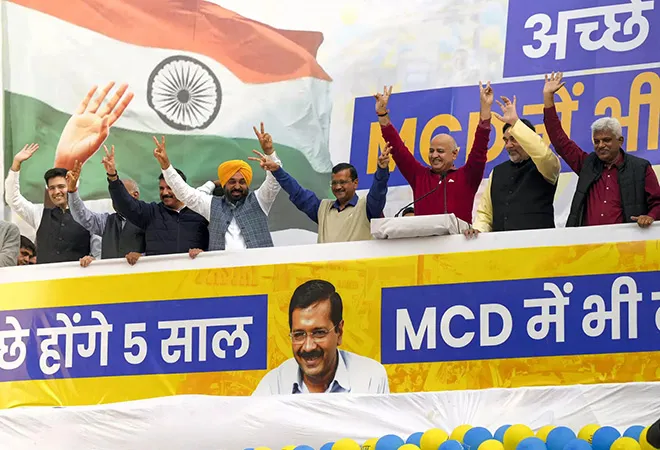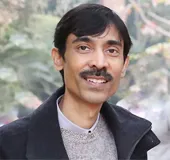
In India’s capital Delhi, following the end of term of local government, namely Municipal Corporation of Delhi (MCD), elections were held in December 2022. Eligible candidates affiliated to various political parties, such as Aam Aadmi Party (AAP), Bhartiya Janata Party (BJP), and Indian National Congress (INC), as well as (independent) candidates without any political party affiliation, contested for seats of municipal councillors in 250 wards of MCD.
The
MCD election results of 2022 are different from those declared five years ago in 2017. This time AAP won 134 (53.6 percent) of the total 250 seats. BJP with 104 seats (41.6 percent) and INC with nine seats (3.6 percent) stood second and third. Three independent candidates also won. In 2017, BJP was in a dominant position in MCD, whereas AAP and INC had a relatively lower proportion of councillors.
Over the years, AAP has gained ground in Delhi. It has repeatedly won Delhi (regarded as national capital territory-NCT) legislative assembly elections since 2013. Emerging victorious in local government (i.e. MCD) elections for the first time in 2022 implies that the party gets an opportunity to serve the residents, or govern Delhi, in a larger way.
The role of MCD is important because it has over 90 percent of Delhi’s population and area under its jurisdiction. NDMC and Cantonment Board together govern less than 6 percent of Delhi’s area.
Delhi is India’s capital and its administration is divided between: (i) the national government; (ii) the government of NCT of Delhi; (iii) three local governments, namely MCD, New Delhi Municipal Council (NDMC), and Cantonment Board. For example, matters relating to land, police, and public order fall under the jurisdiction of the national government, whereas the Delhi (NCT) government and the three local governments are responsible for the provision of numerous civic services.
To mention a few functions, the
Delhi (NCT) government provides drinking water, higher education, public transport facilities, and is also in charge of air quality management, whereas
MCD looks after primary education, solid waste management, and is also responsible for the collection of property tax and issuance of trade, factory, and hawking licences. Many citizen services, such as payment of taxes, registration of grievances, etc., are being provided online.
The role of MCD is important because it has over 90 percent of Delhi’s population and area under its jurisdiction. NDMC and Cantonment Board together govern less than 6 percent of Delhi’s area.
Like most civic bodies in India, the MCD is grappling with numerous
challenges. Some of these relate to revenue generation, payment of salaries to workers, building constructions, road quality, parking of vehicles, and solid waste management. Similarly, the government of NCT of Delhi is often criticised for inferior governance. Its performance on numerous development indicators such as air quality, traffic management, peri-urban and informal growth, and equitable distribution of safe drinking water is fairly low. The overall situation in Delhi in terms of quality of life led by citizens is not very encouraging.
Thus, by gaining power through a democratic process at two levels, i.e. NCT and MCD, the AAP government now has more duties in hand and a greater responsibility of improving the state of affairs in Delhi. Amongst other things, this model of governance has the advantages of developing a strong revenue base, ensuring greater coordination in conducting activities by MCD and the government of NCT, as well as integrated infrastructure planning and development.
This article analyses
10 promises made by AAP to the citizens of Delhi ahead of MCD elections. The political party aims to fulfil these commitments during their five-year tenure in MCD. The issues identified for resolution by the party give an idea of conditions prevailing in India’s capital as well as the quality of governance.
By gaining power through a democratic process at two levels, i.e. NCT and MCD, the AAP government now has more duties in hand and a greater responsibility of improving the state of affairs in Delhi.
Corruption: There are incidents of citizens paying bribes to municipal functionaries for obtaining various municipal services, such as approval of building plans and maps. Such problems will be addressed by the online provision of services. This would require th expansion of digital infrastructure and development of citizen-friendly applications. Citizens belonging to low-income strata prefer to avail services without the use of digital technologies. For this group, greater vigilance at the municipal work place would have to be ensured.
Contract workers: There are thousands of sanitary workers in MCD who have been hired on a contract basis and are working under difficult conditions. The positions of all such workers will be regularised. This will allow them to obtain various facilities that are available to permanent workers. AAP has also committed to addresings worker’s issues related to delay in the payment of monthly salaries. Sufficient funds would be needed to fulfil this promise.
Street vendors and hawkers: A large population is engaged in informal street vending and hawking activities. This is due to their inability to hire or purchase shops in planned market areas. Such activities occur in an unregulated manner in public areas which causes inconvenience to pedestrians and motorists. Besides, the workers are often harassed by police and other authorities. For their protection, AAP promises designated vending zones and licences which will allow them to work properly and without fear. This work requires earmarking land in various parts of the city, careful planning, and project implementation.
Traders: The trading community in different market areas of the city experiences numerous difficulties at work. To help improve their working conditions, charges/fees involved in land-use conversion (from residential to commercial) and vehicle parking will be abolished, sealed shops will be reopened, and licencing process will be digitised. However, the chaos created by trading activity in high-density market areas needs to be better managed.
Education and health: Many MCD schools and health institutions are poorly maintained.
Several schools, for instance, are short of teachers, infrastructure (desks, chairs, computers, toilets), and security guards. Similarly, some dispensaries and hospitals have cracked walls, leaking ceilings, and unhygienic toilets. AAP promises to transform these into world-class institutions. Attaining this goal depends on availability of funds and their proper utilisation.
Roads: The upper layer of a large number of roads has eroded and there are potholes in numerous roads. This causes difficulty in commuting. This problem will be solved by repairing roads and their proper maintenance. The main challenge in this work would be to ensure that repair work is done under supervision and superior materials that last during monsoon season are utilised.
Parking: Motor vehicles have grown rapidly, however, sufficient attention has not been paid by planning agencies towards the creation of adequate and proper parking facilities. Such conditions are witnessed in many commercial areas of the city. AAP calls for the implementation of a rational and permanent solution. Some lessons can be drawn from previously implemented innovative parking projects, however, a sustainable and smart solution to the problem is urgently needed.
Solid waste: MCD has performed poorly in the management of solid waste. This assessment is based on conditions prevailing at the three landfill sites of Bhalswa, Ghazipur, and Okhla. The three sites are oversaturated and have taken a gigantic shape. AAP has vowed to “clear the three garbage mountains”, and will control further deterioration in this regard. For this purpose, the party intends to engage with global experts and employ appropriate technologies for garbage removal and processing. Removal of dumped waste from landfill sites poses a challenge, and in this process, care must be taken to protect the environment and groundwater.
Parks: Parks, gardens and green areas are important societal needs as these are places of recreation, leisure, and exercise. In addition toalleviating quality of life, these attract numerous bird species and help in reducing air pollution. However, only a few parks are properly maintained. This task can be successfully accomplished through landscaping of parks, staff deployment, and ensuring the supply of recycled water.
Stray animals: In several public areas, stray animals (such as dogs, monkeys, and cattle) roam freely causing inconvenience to citizens. Incidents of dog bites are reported frequently. Children are scared of going out of their homes. AAP promises to solve this problem within the existing legal and statutory framework. In the past, such reform measures have been countered by animal rights activists. This issue has remained unattended for long and a permanent solution is necessary.
To conclude, people living in Delhi deserve a better quality of life. In this respect, the outline of work to be performed by MCD under AAP leadership is a desirable move. Although the main objective of a political party for an election is to seek the support of as many voters as possible, AAP has tried to maintain a balance in the selection of issues for resolution. Attending to the grievances of sanitation workers, vendors, and hawkers, traders can be a strategic move to attract a large number of voters. However, the problems reported by this group are valid. Besides, reforms in governance (such as ending corruption), and in various urban sectors (namely education, health, roads, parking, solid waste, parks, stray animals) are included in the scope of work. Translating policy into action will be the real challenge, as MCD’s backlog of work is huge and building its managerial and financial capabilities are equally important requirements.
The views expressed above belong to the author(s). ORF research and analyses now available on Telegram! Click here to access our curated content — blogs, longforms and interviews.



 In India’s capital Delhi, following the end of term of local government, namely Municipal Corporation of Delhi (MCD), elections were held in December 2022. Eligible candidates affiliated to various political parties, such as Aam Aadmi Party (AAP), Bhartiya Janata Party (BJP), and Indian National Congress (INC), as well as (independent) candidates without any political party affiliation, contested for seats of municipal councillors in 250 wards of MCD.
The
In India’s capital Delhi, following the end of term of local government, namely Municipal Corporation of Delhi (MCD), elections were held in December 2022. Eligible candidates affiliated to various political parties, such as Aam Aadmi Party (AAP), Bhartiya Janata Party (BJP), and Indian National Congress (INC), as well as (independent) candidates without any political party affiliation, contested for seats of municipal councillors in 250 wards of MCD.
The  PREV
PREV


